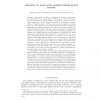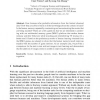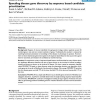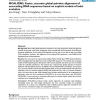125 search results - page 17 / 25 » Using Background Knowledge for Graph Based Learning: A Case ... |
BMCBI
2011
12 years 11 months ago
2011
Background: The search for cluster structure in microarray datasets is a base problem for the so-called “-omic sciences”. A difficult problem in clustering is how to handle da...
CORR
2008
Springer
13 years 7 months ago
2008
Springer
Abstract. We propose a number of techniques for learning a global ranking from data that may be incomplete and imbalanced -- characteristics that are almost universal to modern dat...
PKAW
2010
13 years 6 months ago
2010
How humans infer probable information from the limited observed data? How they are able to build on little knowledge about the context in hand? Is the human memory repeatedly const...
BMCBI
2005
13 years 7 months ago
2005
Background: Regions of interest identified through genetic linkage studies regularly exceed 30 centimorgans in size and can contain hundreds of genes. Traditionally this number is...
BMCBI
2006
13 years 7 months ago
2006
Background: Non-coding DNA sequences comprise a very large proportion of the total genomic content of mammals, most other vertebrates, many invertebrates, and most plants. Unravel...




